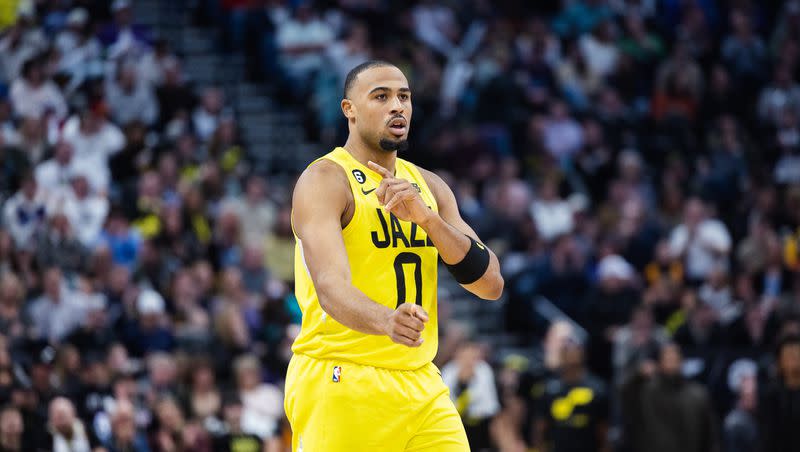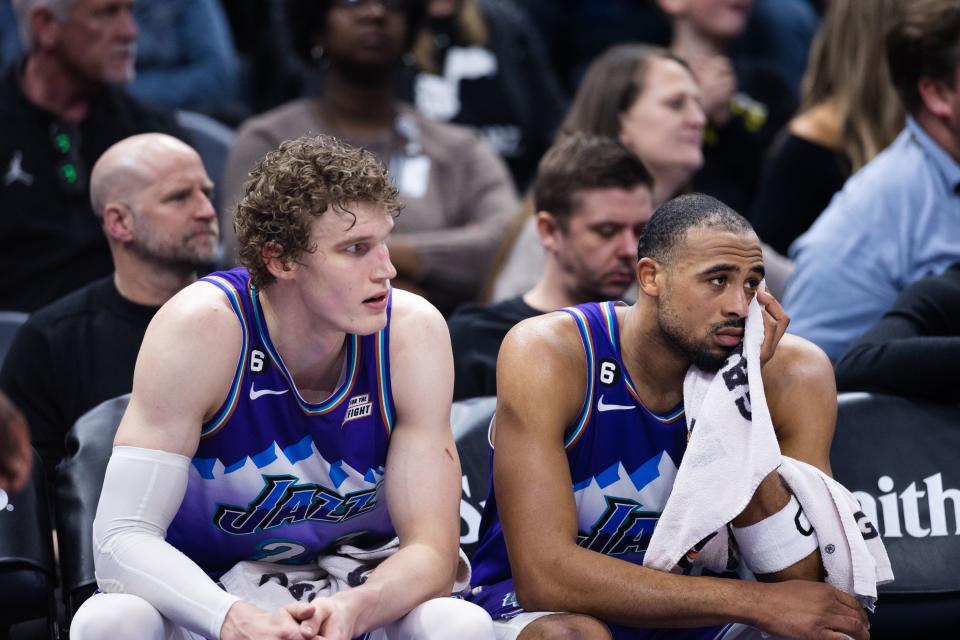Examining the upside and the concerns of Talen Horton-Tucker’s game and his future with the Jazz

This season, the Utah Jazz’s biggest priority has been identifying players that could be a part of the team’s future. A large chunk of that work was made very clear early on in the season when Lauri Markkanen and Walker Kessler proved to be better than advertised.
So, the latter portion of this season has been spent trying to figure out who else on the Jazz roster might make a legitimate case as a reliable role player for a team that wants to contend for a title very soon. It’s pretty clear that the biggest test subject along these lines has been Talen Horton-Tucker.
I’ll say right up front, despite this season of experimentation with Horton-Tucker and the opportunity he’s been given, I don’t know that the Jazz have gained a ton of clarity about what kind of player he can be. If the Jazz are going to gain clarity, it might mean taking parts of next season to figure it out.
But, before we can answer any questions about Horton-Tucker we have to make sure we know what questions need asking. For the Jazz’s purposes, this is not an open-ended, fill-in-the-blank, question about who Horton-Tucker is or what his role can be. Very specifically, the Jazz need to know if he can be a point guard.
Frankly, Horton-Tucker isn’t a good enough shooter and doesn’t work well enough without the ball in his hands to be an NBA shooting guard, so it’s in his best interest to develop into a point guard.
With that in mind, the questions are: can Horton-Tucker play point in the NBA? And if so, is he a starting point guard or a backup?
The case for THT
Though there are still concerns surrounding Horton-Tucker’s game — concerns that have existed since his rookie season — there are four main reasons why Horton-Tucker is still getting this much consideration as his fourth year in the NBA winds down: his youth, his size, his strength and his ability to pressure the rim.
Horton-Tucker is younger than Jazz rookie Ochai Agbaji. I know that sounds impossible, but it’s true. He is just 22 years old and will still be 22 years old when the 2023-24 season begins. All of the talent that feels like is bubbling right under the surface with Horton-Tucker is so tantalizing because it feels like he’s still a raw prospect.
Related
Where would the Utah Jazz be in the NBA draft lottery if the season ended today?
Would the Utah Jazz be in the postseason if the NBA playoffs started today?
If this player, who just scored 101 points over the span of a three-game road trip with the Jazz, was the player you were getting right out of the draft, you would definitely be excited about where his game could go and how much he could grow.
At 6-foot-4, with a wingspan that goes beyond 7 feet and broad shoulders that give him the frame of an NBA forward, Horton-Tucker has a unique body that makes him an ideal NBA point guard. He has an unbelievable combination of size and strength. He’s big, athletic, can take the beating that’s necessary to fight his way to the rim, and his size makes him an incredibly interesting prospect on the defensive end.
Then there’s his skill once he gets downhill, which is only boosted by his strength and size.
When Horton-Tucker gets it in his mind that he’s going to get to the rim, it’s hard to imagine many people that could stop him. He twists and turns and eurosteps and maneuvers in ways that seem inhuman.
If you’re looking for arguments in Horton-Tucker’s favor, look no further than what he’s been able to do since he firmly took over as the Jazz’s starting point guard. He’s averaging 17.9 points, 5.9 assists and 5.1 rebounds per game and when the 2022-23 season comes to a close, it will barely have been 20 games that he’s been playing in a consistent role.
What could he do if his position was not uncertain, if he wasn’t competing for half the season with Nickeil Alexander-Walker and if he had some more clarity?
The case against THT
If we were to leave things with only the information provided above, you’d be hard-pressed to find a front office executive or an NBA coach who wouldn’t be supremely intrigued. But I’m not here to sugarcoat the situation or leave out some of the cons when it comes to Horton-Tucker.
While he is just 22 years old, the truth remains that he has spent four years in the NBA and growth, or lack thereof, needs to be looked at through the lens of a player entering his fifth NBA season.
So, let’s talk about his shooting. He’s a career 28.2% 3-point shooter and that doesn’t seem to have changed over the last four years. He’s fluctuated between 26% and 30% pretty consistently. More importantly, his shot selection is questionable at best and because he doesn’t have the best efficiency, it makes the shots seem even more ill-advised.
On the whole, if you look at his production and opportunity with the Los Angeles Lakers last season, compared to what he’s done with the Jazz this season, things look pretty similar. He’s played in and started in nearly the same number of games. With the Jazz he’s averaged fewer minutes but taken more shots and has only improved by scoring 0.5 more points per game.
He’s shooting 29% from 3 this season and is dishing out roughly one more assist per game, which doesn’t seem to indicate that he’s really changed or developed into an amazing facilitator.
There isn’t a lot of front-facing statistical evidence to suggest that Horton-Tucker has gotten better.
One step forward, 10 steps back?
There are some eye-test moments from this season that make it seem like he has made some improvements as a decision-maker, but it seems like as soon as he does something that makes you believe he’s taken a step forward, he does something else that feels like 10 steps backward.
A starting point guard in the NBA needs to be trusted to do a lot of things. He needs to not only initiate and facilitate the offense, but also be the communication liaison between the coach and the rest of the players. He needs to be trusted to make really important decisions, to know time and score and situation and be ready on the fly to direct traffic according to those variables.
Related
Horton-Tucker often puts his head down and storms toward the basket, and his game-time decisions on how to balance attacking with involving his teammates seems to come only when he gets stuck without somewhere to go.
But with everything above aside, I think that the biggest concern with Horton-Tucker isn’t necessarily something that he does on the court, but rather how he views his own growth.
Multiple times this season, after games when he has seemed to show some improvement or a change in how he operates, he’s been given an opportunity by multiple reporters (myself included) to explain what has changed or the steps that he has taken to grow as a playmaker and a point guard.
In those instances, Horton-Tucker has been pretty insistent that he has not changed. He says that the bad games — the ones with multiple turnovers and with sketchy decisions — are the anomalies. He says that his age needs to be factored in and he believes that he will increase his shooting efficiency in the years to come.
While optimism and confidence are things that would usually be commended, in this instance it signals a lack of self-awareness. If the flashes of improvement and decent point guard decision making are born of Horton-Tucker working to change his game, then that means they are happening by accident, and they can’t be trusted to continue or become consistent.
The Jazz’s decision
Horton-Tucker has an $11 million player option for next season that he’s sure to pick up. The Jazz could choose to trade him before next season’s trade deadline if they feel that they’ve seen enough and are able to get a good return value.
If they choose to stick with Horton-Tucker beyond next season, it will certainly cost them more than his current salary. That would lead to the next set of questions where Horton-Tucker is concerned. Is he worth $13 or $15 million or more? Are the Jazz going to draft a point guard that they feel will be a better starting option moving forward? If we’re talking about Horton-Tucker as a backup point guard, would the Jazz rather take a chance on someone like Kris Dunn? And, where does Collin Sexton factor into all of this?
As soon as this season ends, the Jazz are going to need to address all of these questions with some serious consideration and try to make the best decision possible for the team’s future. It’s possible though, that the Jazz want just a little more time with Horton-Tucker and go into the 2023-24 season still feeling uncertain about Horton-Tucker and what kind of potential he has.


